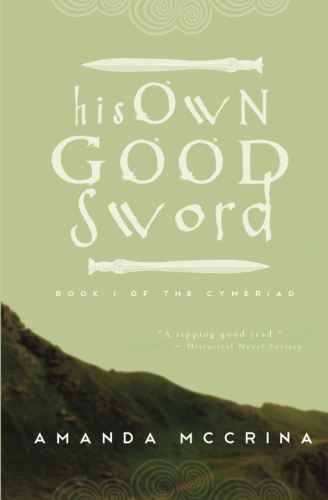
I took a couple classes over the summer—one of them the core math course I’d been putting off since freshman year—so I wasn’t expecting to have much spare reading time. Surprisingly, I was able to knock quite a bit off my to-read list, including some books I’d been dying to read for a while—namely, Elizabeth Wein’s Code Name Verity and The Winter Prince. On first reading I liked Code Name Verity and loved The Winter Prince. I do feel that Code Name Verity probably requires a thorough rereading before I can judge it adequately; but I’ll be posting my review of The Winter Prince in short order. In the meantime here are some other highlights of the summer—likes, dislikes, and everything in between. Links are to my original Goodreads reviews.
The good
- Heather, Oak, and Olive by Rosemary Sutcliff. Five of five stars. This is a (sadly out-of-print) collection of three short stories told with Sutcliff’s characteristic achingly beautiful prose and keen sense of emotion. I enjoyed each story, but I think “A Crown of Wild Olive” was my favorite. Highly recommended.
- Between Shades of Gray, by Ruta Sepetys. Four of five stars. A powerful story about one of the often-neglected areas of WWII, Stalin’s brutalization of the Baltic states and Eastern Europe. (In US survey history courses we still have a tendency to try to justify the fact we were allied with him.) Despite some uneven pacing and a narrative voice that occasionally sounds too young or simplistic, this is a strong debut effort, full of likable and well-rounded characters, faithful to the grimness of its setting without being hopeless.
The decent
- The Last Policeman by Ben H. Winters. Three-and-a-half of five stars. Neatly plotted, satisfactorily resolved, with a few threads left hanging for a sequel (which I’ll read). But, while the pre-apocalyptic setting gave Winters a remarkable opportunity to explore the depths of the human psyche, I felt he never really took full advantage of that opportunity. The characters are forgettable, faceless, bland. We never learn, for example, exactly why Detective Palace—unlike his peers—feels so driven to do his duty and solve the mystery; we never get to see what makes him tick. Hopefully the sequel(s) will spend more time on character development.
- The Girl of Fire and Thorns by Rae Carson. Three of five stars. I loved the beginning of this book. I loved the Mediterranean-flavored setting, and the fact that Elisa was not a typical fantasy protagonist, and the attention given to war-time politics and strategy, and the fact that the arranged marriage had a chance to develop into a loving and respectful relationship. Unfortunately, most of this started falling apart at about the mid-way point of the book. Spoilers follow . . . Elisa sheds a few pounds and suddenly becomes a typical knife-wielding YA action heroine. Rather than being developed as possibly the most intriguing character in the book*, Alejandro is left woefully underdeveloped. Other characters, too, head in predictable and disappointing directions after the excellent beginning. And, while I thought the religious aspect was mostly well-done and intriguing, it all seems negated by the end of the novel, when Elisa makes the frustratingly trite realization that it’s not about faith in God but in herself. A unique, thoughtful exploration of religious devotion ultimately gives way to cheap and cliched find-your-own-inner-strength sentiment. Disappointing. I think Megan Whalen Turner’s Queen’s Thief series does a much better job handling religion.
The disappointing
- The Seven Towers by Patricia Wrede. Two-and-a-half of five stars. An OK book that could have been much better if the author had slowed the pace and developed the characters more. Some of them are likable characters, but we never get to know them very well. We’re told their emotions, rather than shown: a reconciliation that should have been particularly moving, towards the end of the book, is bland and emotionless, as are the deaths of two major characters. Much of the action, too, is told rather than shown; important events are skimmed over so quickly that you might miss them if you blink. I was disappointed by the ending, which was predictable and cheap. Jermain and Carachel are definitely the highlights in this otherwise mundane fantasy plot, but even they suffer from the shallowness of the narrative. I’d have liked to see more inner conflict from Jermain, particularly—he gets betrayed by two close friends, tragically loses a third, but none of this ever really registers.
- Traitor by Gudrun Pausewang. Two of five stars. Originally published in Germany, this is the story of a teenaged German girl who hides an escaped Russian POW in her barn in the last months of WWII. It’s an exciting premise, but Traitor didn’t live up to my expectations. Too much telling rather than showing, and a lot of heavy-handed moralizing. None of the characters are likable or have any depth. The narration is much too simplistic and childish, which makes the handling of the very mature themes clumsy and ineffective. The ending is shocking and brutal and comes out of nowhere—really, it’s one of the most disappointing endings I’ve ever read.
- The Moon Dwellers by David Estes. One of five stars. Simply not my cup of tea. The post-apocalyptic setting was too thinly drawn and simplistic to be plausible. The two POV characters are indistinguishable in personality and voice, and neither develops in any way over the course of the story. None of the characters exhibit much complexity: good guys are good guys, bad guys are bad guys—no shades of gray here. And there were too many deus ex machinas to count. I picked this up as a freebie, with no real expectations, so I can’t really say I was disappointed. But I don’t feel inclined to continue on to the rest of the series.
* Really. I wish someone would write a really good cowardly character—I mean a true coward, too, not a Han-Solo type whose underlying bravado will automatically show forth under pressure; and not necessarily a whinging, thoroughly weak character. I think Hemingway’s Pablo (in For Whom the Bell Tolls) is the best cowardly character I’ve ever encountered in literature.

 I'm a student, amateur historian, coffee connoisseur, movie buff, hockey fan, cat lady, and all-around nerd. I'm currently pursuing a degree in history and political science at the University of West Georgia. In my spare time, I write historical fiction and fantasy. My debut YA historical fantasy novel His Own Good Sword was released on 7 May 2013.
I'm a student, amateur historian, coffee connoisseur, movie buff, hockey fan, cat lady, and all-around nerd. I'm currently pursuing a degree in history and political science at the University of West Georgia. In my spare time, I write historical fiction and fantasy. My debut YA historical fantasy novel His Own Good Sword was released on 7 May 2013.


